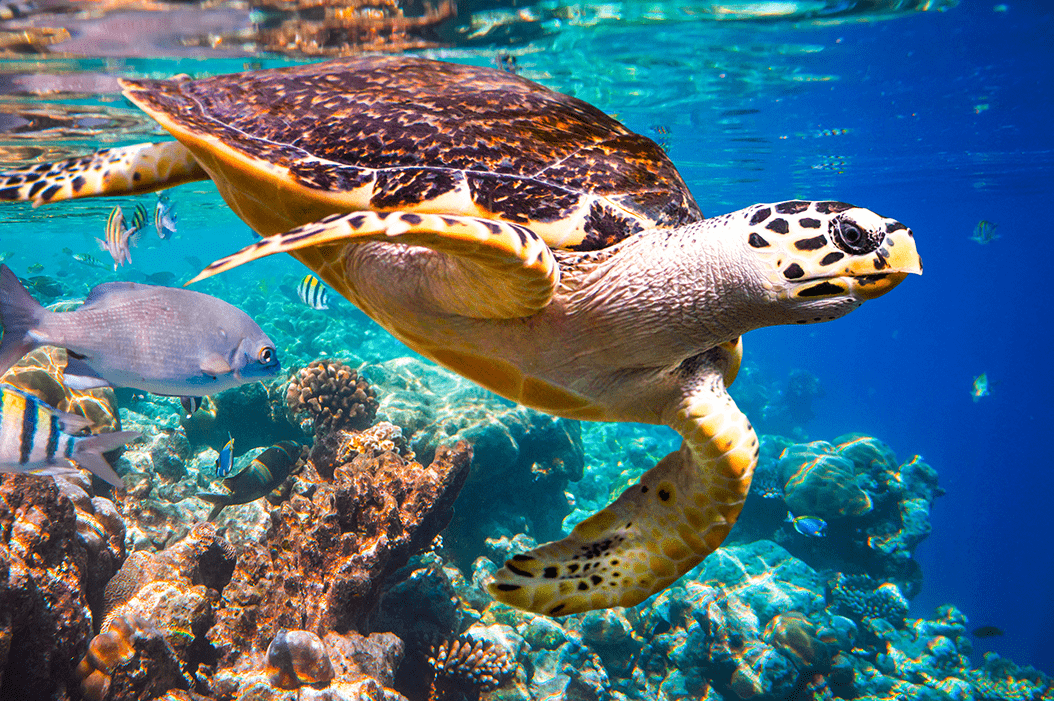Marine ecosystem conservation is all about protecting and preserving seas and oceans, which is well-known as the conservation of marine resources.
It focuses on restricting human-caused damage to marine ecosystems. Restoring damaged marine resources play a vital role in marine ecosystem conservation.
When it comes to marine conservation, preserving vulnerable resources always comes first. Coral reefs are affected due to climate change to a great extent. Moreover, other human activities can also lead to coral reef damage.


Tropical coral reefs
Most important, tropical coral reefs comprise over 0.1% of the total ocean area. These are ranked among the top bio-diverse ecosystems on Earth.
Such a diverse ecosystem supports almost one-quarter of all marine species' resources. Coral reefs can be found in more than 100 countries, including over 80 developing countries.
There are many factors that lead to greater loss rates of coral reefs, such as extreme weather conditions and damage during storms. The conservation of marine ecosystems is vital for the protection of coral reefs.
The marine conservation concept might be relatively new for you. In the 1960s, major fish populations were facing a decline, and ecosystems were facing a sudden decrease.
Read more: How to protect the oceans and marine life
For that reason, marine conservation has become one of the major issues on Earth today. Although these ecosystems have changed rapidly, oceans are managed independently regardless of the land environment.
Remember, the water percentage on our planet is almost 71%, which means the major marine conservation issues are related to the state of our waterways.
There are many factors that negatively affect our oceans, such as pollution, climate change, acidification, sedimentation, and many more.
These things have been affected by our oceans negatively over many years. These factors lead to many effects, some of which are visible. Most of them are invisible that are more difficult to manage.

What can I do to help protect coral reefs?
Every one of us has the responsibility to play a critical role in protecting coral reefs. Whether you live near the coast or hundreds of miles away, you can do several things to ensure coral reefs are healthy and conserved.
Water is the main source where most of the dangers occur to coral reefs. It doesn’t mean that the effects cannot occur directly on land. It can occur on land even that is far away from the coast.
You can adopt several lifestyle changes that can make a huge difference in terms of the health of coral reefs.
Recycle and dispose of your trash
Do you know marine debris is very harmful to coral reefs? For that reason, recycle and dispose of your trash properly. You can recycle various trash at home easily, such as plastic.
Offset your plastic footprint
However, make sure to remember the three R’s when considering disposing of trash. These three R’s include Reduce, Reuse, and Recycle.
Moreover, you need to know about the bins categories to place the trash in your home. Never leave any trash behind on beaches.
Volunteering activities can keep rivers and streams. Such activities should pick up the trash in your community properly. For annual trash cleanups, visit your local environmental organizations' website. You can even check the annual International Coastal Cleanup.
Use fertilisers sparingly
The use of fertilisers to a great extent or in large quantities on lawns can affect water quality. There are nutrients (nitrogen and phosphorus) in the fertiliser that can be washed into waterways and piled up in oceans. Such nutrients can pollute the water and eventually harm coral reefs to a great extent.
Reduce stormwater runoff
Water pollution can be controlled by reducing stormwater runoff. It can also reduce flooding and protect water resources. Installing rain gardens is the best thing that homeowners can do.
Using rain barrels can help you collect rainwater that would be diverted to storm drains otherwise.
Coral reefs are of great importance
Coral reefs are degrading at a rapid pace. Most factors contributing to this dehydration of global coral reefs include overfishing, nutrient and sediment loading, several land-based activities, extreme temperatures due to climate change, and ocean acidification.
These factors are negatively affecting and putting pressure on the coral reefs. Therefore, proper action is needed to protect the coral reefs. About 25-50% of the world’s coral reefs have been lost over the last 30 years.
If the situation goes on the same as this, a greater loss is predicted of coral reef ecosystems across the world.
In conclusion, conserving marine ecosystems, specifically, the protection of seas and oceans, is crucial for preserving coral reefs and the diverse marine life they support. Coral reefs are highly vulnerable to climate change and human activities, and their degradation poses a significant threat to global biodiversity. Marine conservation has emerged as a pressing issue, considering the decline of fish populations and the overall health of marine ecosystems. The responsibility to protect coral reefs falls on all individuals, regardless of their proximity to the coast. By adopting sustainable practices, such as proper waste disposal, reducing plastic consumption, and minimizing the use of fertilisers, we can contribute to the health and preservation of coral reefs. It is essential to recognise the importance of coral reefs and take immediate action to prevent further loss and protect these valuable ecosystems for future generations.





